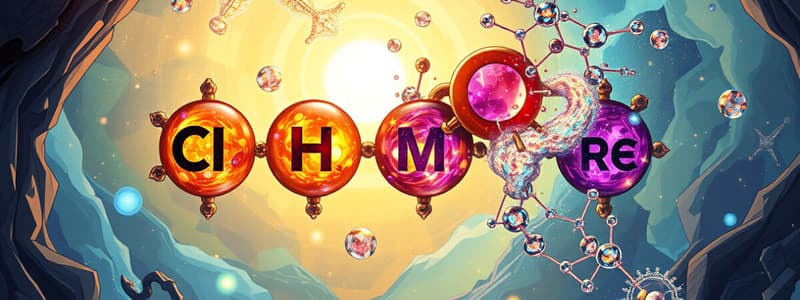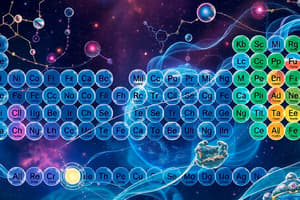Podcast
Questions and Answers
Anything that occupies space and possesses mass is called _____________.
Anything that occupies space and possesses mass is called _____________.
matter
Which branch of chemistry deals with compounds produced by living organisms?
Which branch of chemistry deals with compounds produced by living organisms?
biological
What is a statement that describes the chemical properties of matter?
What is a statement that describes the chemical properties of matter?
Characteristics that are observed only when the substance is interacting with other substances.
Which discipline focuses on the study of matter and the changes it undergoes?
Which discipline focuses on the study of matter and the changes it undergoes?
Which branch of chemistry focuses on the chemical processes of dead organic substances in terms of decomposition, disinfection, and preservation?
Which branch of chemistry focuses on the chemical processes of dead organic substances in terms of decomposition, disinfection, and preservation?
______________ chemistry studies the properties and reactions of elements, excluding organic and certain carbon-containing compounds.
______________ chemistry studies the properties and reactions of elements, excluding organic and certain carbon-containing compounds.
__________________ chemistry is the study of carbon and carbon-containing compounds.
__________________ chemistry is the study of carbon and carbon-containing compounds.
What is the freezing point of water?
What is the freezing point of water?
Which type of chemical reaction absorbs heat?
Which type of chemical reaction absorbs heat?
What is the boiling point of water in Celsius?
What is the boiling point of water in Celsius?
What is the energy of motion?
What is the energy of motion?
The ability or capacity to do work is known as __________.
The ability or capacity to do work is known as __________.
What are the three classifications of matter?
What are the three classifications of matter?
Density = weight / volume.
Density = weight / volume.
The mass per unit volume or the mass of an object divided by its volume equals the __________.
The mass per unit volume or the mass of an object divided by its volume equals the __________.
What describes a substance that has a definite shape and definite volume?
What describes a substance that has a definite shape and definite volume?
Which of the following is NOT one of the 5 evidences of chemical changes?
Which of the following is NOT one of the 5 evidences of chemical changes?
What is a property NOT associated with metals?
What is a property NOT associated with metals?
Energy associated with motion is kinetic energy.
Energy associated with motion is kinetic energy.
Hydrogen is known as a reducing agent.
Hydrogen is known as a reducing agent.
Oxidation is the __________ of hydrogen from a substance.
Oxidation is the __________ of hydrogen from a substance.
Reduction is the __________ of oxygen from a substance.
Reduction is the __________ of oxygen from a substance.
Pure substances made of two or more different elements bonded together are called __________.
Pure substances made of two or more different elements bonded together are called __________.
Matter that is homogeneous and cannot be broken down into smaller parts is called __________.
Matter that is homogeneous and cannot be broken down into smaller parts is called __________.
What describes the process by which a substance is given a definite form?
What describes the process by which a substance is given a definite form?
What is the definition of a compound?
What is the definition of a compound?
What is the oxidation number of C in CO2?
What is the oxidation number of C in CO2?
What represents hydroxide?
What represents hydroxide?
Casket company X sold a casket that was 2 meters long. Is this long enough for a client who is 6'5" tall?
Casket company X sold a casket that was 2 meters long. Is this long enough for a client who is 6'5" tall?
What is the boiling point of water for Fahrenheit?
What is the boiling point of water for Fahrenheit?
What is the process of a substance changing from solid to gas called?
What is the process of a substance changing from solid to gas called?
Flashcards
Matter
Matter
Anything that occupies space and possesses mass.
Chemistry
Chemistry
The study of matter and its interactions.
Inorganic Chemistry
Inorganic Chemistry
Focuses on properties and reactions of elements, excluding organic compounds.
Organic Chemistry
Organic Chemistry
Signup and view all the flashcards
Chemical Properties
Chemical Properties
Signup and view all the flashcards
Chemical Change
Chemical Change
Signup and view all the flashcards
Physical Change
Physical Change
Signup and view all the flashcards
Exothermic Reaction
Exothermic Reaction
Signup and view all the flashcards
Endothermic Reaction
Endothermic Reaction
Signup and view all the flashcards
States of Matter
States of Matter
Signup and view all the flashcards
Solid
Solid
Signup and view all the flashcards
Liquid
Liquid
Signup and view all the flashcards
Boiling Point
Boiling Point
Signup and view all the flashcards
Freezing Point
Freezing Point
Signup and view all the flashcards
Density
Density
Signup and view all the flashcards
Element
Element
Signup and view all the flashcards
Compound
Compound
Signup and view all the flashcards
Atomic Number
Atomic Number
Signup and view all the flashcards
Ductility
Ductility
Signup and view all the flashcards
Malleability
Malleability
Signup and view all the flashcards
Sublimation
Sublimation
Signup and view all the flashcards
Homogeneous Mixture
Homogeneous Mixture
Signup and view all the flashcards
Kinetic Energy
Kinetic Energy
Signup and view all the flashcards
Potential Energy
Potential Energy
Signup and view all the flashcards
Oxidation
Oxidation
Signup and view all the flashcards
Reduction
Reduction
Signup and view all the flashcards
Decomposition
Decomposition
Signup and view all the flashcards
Study Notes
Matter and Chemistry
- Matter is defined as anything that occupies space and possesses mass.
- Chemistry is the discipline centered on the study of matter and its interactions.
- Inorganic chemistry focuses on the properties and reactions of elements, excluding organic compounds.
- Organic chemistry studies compounds containing carbon.
Chemical Properties and Reactions
- Chemical properties are characteristics observed when a substance interacts with others.
- A chemical change results in the formation of a new substance, while physical changes do not alter the substance's identity.
- Exothermic reactions release heat, whereas endothermic reactions absorb heat.
States of Matter and Temperature
- Matter exists in different states: solids, liquids, and gases.
- A solid has a definite shape and volume; a liquid has a definite volume but no specific shape.
- The boiling point of water is 100 degrees Celsius, and the freezing point is 0 degrees Celsius.
- Normal body temperature is 37 degrees Celsius (98.6 degrees Fahrenheit).
Measurements and Units
- Density is defined as mass per unit volume.
- The metric prefixes: "centi" equals one-hundredth, "deci" equals one-tenth, "mega" equals one million.
- Heat is measured in calories, and energy is the ability to do work.
Elements and Compounds
- An element is a pure substance that cannot be broken down and is found on the periodic table.
- Compounds are pure substances made of two or more different elements bonded together.
- The atomic number of an element is equal to the number of protons it has.
Chemical Symbols and Formulas
- Common elements include:
- Oxygen (O)
- Sodium (Na)
- Carbon (C)
- Phosphorus (P)
- Sulfur (S)
- Calcium (Ca)
- Mercury (Hg)
- Platinum (Pt)
- Iron (Fe)
- Nitrogen (N)
Properties of Substances
- Properties used to describe matter include ductility (ability to be drawn into wire) and malleability (ability to be shaped or molded).
- Sublimation refers to a phase change from solid to gas without becoming a liquid.
- Homogeneous mixtures consist of components that are evenly distributed.
Important Chemical Concepts
- Hydrogen is the lightest and most abundant element and is known as a reducing agent.
- Oxygen is the most abundant element on Earth and plays a crucial role in oxidation-reduction reactions.
- Oxidation involves the removal of hydrogen from a substance or the addition of oxygen, while reduction involves the removal of oxygen.
Special Considerations in Chemistry
- Energy associated with motion is termed kinetic energy, whereas stored energy is referred to as potential energy.
- The simple classification of matter includes elements, compounds, and mixtures.
- Physical state description: A liquid has no specific shape but possesses a specific volume.
Changes in Matter
- The decomposition of a body after death involves both physical and chemical changes.
- Slow decomposition can occur at lower temperatures, similar to rust formation in metals.
- Chemical and physical processes are explored in areas such as embalming, highlighting their significance in applied chemistry.
Studying That Suits You
Use AI to generate personalized quizzes and flashcards to suit your learning preferences.
Description
Test your knowledge of key concepts in Inorganic Chemistry with these flashcards covering Chapters 1 to 6. Each card features important terms and definitions to help reinforce your understanding of the subject matter related to chemical properties and biological compounds.




